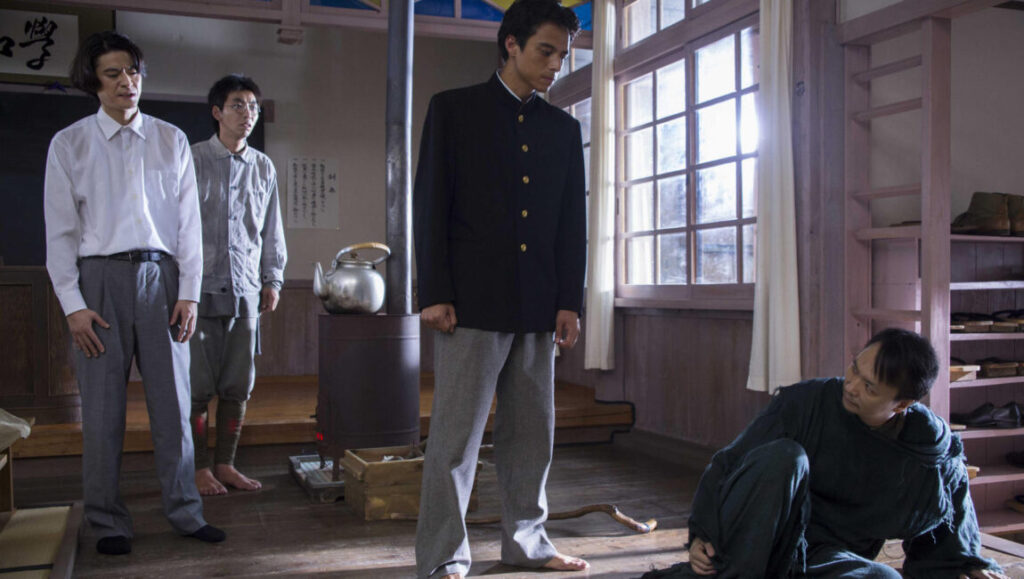“Seen through the wrong end of a telescope, an ordinary scene becomes an ancient story. No, it’s not nostalgia! It’s heartache for all that’s lost.” This quote from Kazuo Dan’s 1937 novel Hanagatami, a coming-of-age story set in a coastal village during Japan’s pre-WWII invasions of Manchuria and China, appears onscreen at the beginning of Nobuhiko Obayashi’s film adaptation, both as an introduction to the themes of the story and a guide to the viewer. An irised, black-and-white image of the film’s young protagonist Toshihiko (Shunsuke Kubozuka) standing atop a cliff, waves crashing against the rocks below — along with intertitles and a choppy framerate that suggests the quality of movement in silent film reels — immediately evokes early 20th century melodrama, immersing the viewer in an idea of the past so formally disorienting as to transcend nostalgia. This introduction heralds Hanagatami’s many re-inventions of the wild, hallucinatory, in-camera techniques that characterized Obayashi’s 1977 cult classic, House; overlaid CG effects, abundant greenscreen, and frenetic digital zooms all contribute to an equally phantasmagoric vision here. But whereas these elements (and a vibrant color scheme and psychedelic pop-rock soundtrack) lent House its childlike imagination, in Hanagatami they suggest a memory of the past distorted by time, grief, and anger, becoming something both vivid and surreal. Obayashi uses his myriad tools of artifice to collapse the distinction between the “ordinary scenes” of Dan’s novel and the “ancient story” of Japan’s indoctrination of young people into nationalism and the glory of military sacrifice.
Hanagatami is an anti-war film with no battle scenes, a period melodrama unstuck in time, a long-gestating lament for a nation consuming its young.
The film was in fact first conceived by the director 40 years ago, but only completed at age 79, after he was diagnosed with terminal cancer; it navigates a structure at once linear and digressive, but with relentless momentum. Images and voices of dead lovers intrude on the present, while the same few bars of Bach’s “Cello Suite No. 1” play over and over, interwoven with a swelling original score. There are dizzying moments when the camera, its subjects, and the digitally inserted backdrops all seem to move separately, unmoored from time and reality. The displacement of time is especially prevalent in Obayashi’s decision to cast actors in their mid-30s as teenage boys, playing characters’ bold emotional beats with no hint of irony and creating a sense of kids growing old before their time, having had their childhoods cut tragically short by a recurring cycle of destruction. Hanagatami is an anti-war film with no battle scenes, a period melodrama unstuck in time, a long-gestating lament for a nation consuming its young; it’s more urgently inventive than any film released this year, rife with fascinating contradictions, and undoubtedly the work of a lifetime.
You can currently stream Nobuhiko Obayashi’s Hanagatami on Mubi.


Comments are closed.